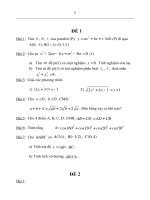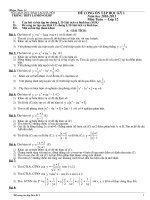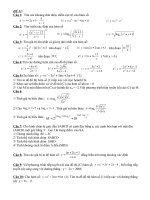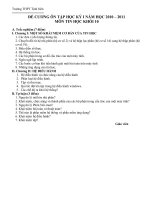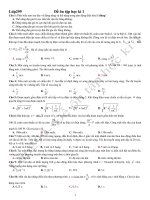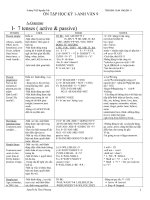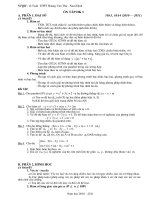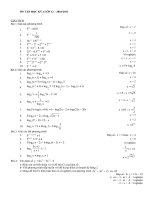De on tap HK1
Bạn đang xem bản rút gọn của tài liệu. Xem và tải ngay bản đầy đủ của tài liệu tại đây (114.59 KB, 7 trang )
<span class='text_page_counter'>(1)</span>THANH HOA High School Class: 12C Name:. THE ORAL TEST IN ENGLISH Time: 15 mins Date:. Marks: Comments:. A Mark the letter A, B, C or D on your answer sheet to indicate the word whose underlined part is pronounced differently from that of the rest in each of the following questions. 1. A. ship B. machine C. function @D. suggestion 2. @A. heart B. said C. memory D. head 3. @A. father B. hat C. candle D. sad 4. A. skills B. needs @C. meets D. enjoys 5. A. washed @B. attended C. passed D. finished 6. @A. accompany B. simplify C. supply D. qualify 7. A. reformed @B. appointed C. stayed D. installed 8. @A. initiate B. contain C. domestic D. attentive 9. A. household B. associate @C. colony D. enclose 10. @A. cough B. weight C. might D. though Mark the letter A, B, C or D on your answer sheet to indicate the word whose main stress is placed differently from that of the rest in each of the following questions. 11. @A. unhappy B. differently C. newspaper D. timetable 12. A. musician B. historic C. activities @D. Vietnamese 13. A. universities B. volunteer C. afternoon @.D. interview 14. A. dislike B. untrue @. doctor D. hotel 15. A. listen @B. occur C. follow D. washing 16. A. technique B. attract @. C. recent D. champagne 17. @A. television B. introduce C. lemonade D. cigarette 18. A. complete @B. nervous C. delete D. Chinese 19. A. biology B. activity @C. picturesque D. Australia 20. A. mountain B. village C. scientist @D. rebuild Read the following passage and mark the letter A, B, C or D on your answer sheet to indicate the correct answer to each of the questions. In the United States and Canada, it is very important to look a person directly in the eyes when you have a conversation with him or her. If you look down or to the side when the other person is talking, that person will think that you are not interested in what he or she is saying. This, of course, is not polite. If you look down or to the side when you are talking, you may appear to be hiding something; that is, it might seem that you are not honest. However, people who are speaking will sometimes look away for a few seconds when they are thinking or trying to find the right word. But they always turn immediately back to look the listener directly in the eyes. These social “rules” are the same for two men, two women, a man and a woman, or an adult and a child. 21. In the US and Canada, when you have a conversation with someone,__________. A. do not look directly in the eyes B. it is impolite to look at the eyes of the speaker or hearer @C. you should look him or her directly in the eyes D. you must avoid looking at him or her 22. If you look down or to the side when the other person is talking _________. @A. you will be thought to be not interested in the conversation B. you are very interested in what is being said C. you are very polite D. you are the interesting person 23. If you look down or to the side when you are talking,_________. A. the American are interested in you @B. you are thought to be dishonest C. you are very polite D. you are interested in the conversation 24. The speaker will sometimes look away ____________. A. because he or she wants to end the conversation.
<span class='text_page_counter'>(2)</span> B. because he or she thinks that the hearer is not honest C. because the hearer is interested in what is being said @D. because he or she is thinking or finding the right word 25. These social “rules” are ________. A. for men only B. for women only C. for children only @D. the same for everybody Every year, millions of tourists visit California. California is known for its beautiful scenery, warm climate, and excellent food. There are twenty national parks in California, which over thirty million people visit every year. California also has many world-famous museums. The state is divided into two parts: Northern California and Southern California. San Francisco is in Northern California. It is surrounded by water on three sides and is a city with beautiful bays and several bridges. Its streets are always crowded with tourists. There is an area in the south of San Francisco that is famous for the computer industry; it is called Silicon Valley. Los Angeles, Hollywood, and Disneyland are all situated in Southern California. Southern California is known for its desert areas, which are sometimes next to snow-covered mountains. It is one of the few places in the world where you can ski in the morning and surf in the afternoon. 26. ______ visit California’s national parks every year. |@A. Over thirty million people B. About thirty thousand tourists C. Hundreds of millions of tourists D. Twenty million people 27. California is divided into ______. A. San Francisco and Hollywood @B. Northern California and Southern California C. San Francisco and Los Angeles D. Hollywood and Disneyland 28. What is Silicon Valley well known for? @A. The computer industry. B. Beautiful scenery. C. Excellent food. D. Beautiful bays. 29. Which of the following is NOT in Southern California? A. Disneyland. B. Los Angeles. @C. San Francisco. D. Hollywood. 30. Where are the desert areas found? A. In Northern California. B. Near Silicon Valley. @C. In Southern California. D. In San Francisco. In 1956, a young Swedish sailor on a ship at sea became bored. He wrote a message and put it in a bottle. The message gave his name and address and asked any pretty girl who found it to write to him. Two years later, an Italian fisherman found the bottle and showed the message to his daughter. Just for a joke, she wrote to the sailor. He replied, and soon they started writing to each other regularly. Then they decided to meet. Shortly after their first meeting, they got married. 31. The young Swedish sailor on a ship at sea put a message in a bottle ________________. A. because he needed help @B. because he got fed up C. because he wanted to get married D. because he wanted to meet the fisherman’s daughter 32. In the message, the sailor _________________. A. asked an Italian fisherman to find it B. gave the Italian fisherman’s name and address C. wrote to the fisherman’s daughter a love poem @D. asked any girl to write to him 33. The fisherman’s daughter wrote to the sailor ________________. @A. for fun B. for help C. for a marriage D. for a job 34. The sailor and the fisherman’s daughter got married ________________. A. shortly after she wrote to him B. shortly after he threw the bottle into the sea @C. shortly after they first met D. as soon as the fisherman gave the bottle to his daughter.
<span class='text_page_counter'>(3)</span> 35. Which statement is NOT true according to the passage? A. The young Swedish sailor put a message with his name and address on it into a bottle. B. The Italian fisherman found the bottle in 1958. C. In the end, the young Swedish sailor married the Italian fisherman’s daughter. @D. The Italian fisherman prevented his daughter from marrying the sailor. Read the following passage and mark the letter A, B, C, or D on your answer sheet to indicate the correct word(s) for each of the blanks. There are several things to remember if you are applying for a new job. Most companies (36) ______ their vacancies in the newspapers, and there are normally a lot of applicants for each post. Therefore, a good letter of (37) ______ is very important. You should enclose with it your curriculum vitae so that the employer knows about your (38) ______ and experience. If you are applying (39) ______ a large company, address your letter to the personnel manager, who deals with appointing new staff. If you are invited to an interview, make (40) ______ you are suitably dressed and on time. You may ask about promotion prospects as well as further training, the salary and holiday arrangements. 36. A. write B. market C. make @D. advertise 37. A. apply @B. application C. applying D. applicator 38. A. schools B. forms C. licences @D. qualifications 39. A. in B. with @C. to D. at 40. @A. sure B. clear C. good D. right William Shakespeare was one of the greatest writers in the English literature. He was born in 1564 in Stratford-upon-Avon. (41)______ the age of eighteen he married Anne Hathaway, (42)______ was eight years older than himself. A few years later he moved to London, where he worked as an actor and a playwright. Shakespeare (43) ______ 36 plays and 154 sonnets (a kind of poem). His most famous plays are the four great tragedies - Othello, Macbeth, Hamlet, and King Lear. Shakespeare died in Stratford-upon-Avon on 23 April 1616. His (44) ______ are still very popular today: they have been (45)______ into different languages. 41. A. In @B. At C. On D. From 42. A. whose B. which C. whom @D. who 43. A. write B. writes @C. wrote D. written 44. @A. plays B. cartoons C. films D. actors 45. A. changed @B. translated C. replaced D. exchanged We can (46) __________ other people in many different ways. We can talk and write, and we can send messages with our hands and faces. There is also the phone (including the mobile!), the fax, and e-mail. Television, film, painting, and photography can also communicate ideas. Animals have ways of (47) __________ information, too. Bees dance and tell other bees where to find food. Elephants make sounds that humans can’t hear. Whales sing songs. Monkeys use their faces to show anger and love. But this is nothing compared to what people can do. We have language – about 6,000 languages, in fact. We can write poetry, tell jokes, make promises, explain, persuade, tell the truth, or tell lies. And we have a sense of past and future, not just present. Radio, film, and television (48) __________ a huge influence on society in the last hundred years. And now we have the Internet, (49) __________ is infinite. But what is this doing to this? We can give and get a lot of information very quickly. But there is so (50) __________ information that it is difficult to know what is important and what isn’t. Modern media is changing our world every minute of every day. 46. A. speak about B. talk with @C. communicate with D. tell about 47. A. changing @B. exchanging C. transferring D. giving 48. A. have @B. have had C. are having D. had 49. A. who B. when C. that @D. which 50. @A. much B. many C. little D. few Mark the letter A, B, C or D on your answer sheet to show the underlined part that needs correction. 51. I am looking for my keys, but I haven’t found it..
<span class='text_page_counter'>(4)</span> A B C @D 52. The teacher said me to sit down at the table and do my homework. @A B C D 53. The police asked me what had he done the night before, but I was unable to tell them. @A B C D 54. Not only the students but also the teacher are very worried about the final exam results. A B @C D 55. He studied very hard, so he passed the exam easy. A B C @D 56. I felt very tiring when I arrived home, so I went to bed at once. @A B C D 57. People respected him because he was a honest man. A B @C D 58. Have you ever read any novels writing by Jack London? A B @ D 59. We are going to visit our grandparents when we will finish our final exams. A B C @D 60. I have been working hardly for two weeks and now I feel like a rest. A @B C D Mark the letter A, B, C or D on your answer sheet to indicate the correct answer to each of the following questions. 61. A scientist who studies living things is a ______. @A. biologist B. biologically C. biology D. biological 62. Yesterday I met your brother, ______ had taken us to the Headquarters of the United Nations in New York before. @A. who B. whose C. whom D. that 63. ______, we couldn't have continued with the project. A. Unless we had your contribution B. Provided your contribution wouldn't come C. Even if you didn't like to contribute @D. If you hadn't contributed positively 64. In general, my father doesn't mind ______ the housework, but he hates to do the cooking. A. to do @B. doing C. do D. done 65. Thomas Edison was a famous American ______. A. invent B. invention @. inventor D. inventive 66. Many young people want to work for a humanitarian organization, ______? A. do they @B. don’t they C. can’t they D. are they 67. Jack asked his sister ______. A. where would she go the following day B. where you will go tomorrow @C. where she would go the following day D. where will you go tomorrow 68. Peter apologized ______. A. me for phoning not earlier B. for phoning me not earlier C. not to phone me earlier @D. for not phoning me earlier 69. We are talking about the writer ______ latest book is one of the best-sellers this year. A. who B. whom C. which @D. whose 70. My younger sister is not ______ to study overseas. @A. old enough B. so old C. enough old D. very old 71. Robert ______ in three important water polo games so far. A. had played B. is playing @C. has played D. played 72. My grandmother takes ______ for keeping house. A. probability B. ability C. possibility @D. responsibility 73. Many people ______ homeless after the earthquake in Haiti a few months ago. A. become B. will become @C. became D. are becoming 74. He has made so many mistakes in his essay that he ______ do it all again. A. needs B. ought C. used to @D. has to.
<span class='text_page_counter'>(5)</span> 75. Unless we can find new sources of energy, our life will certainly ______. A. affected B. be affecting C. affect @D. be affected 76. ______ the salary meets my expectations, I will accept the job offer. A. So B. Therefore @C. If D. Although 77. Despite its successful ______ reforms, this country is still a developing one. @A. economic B. economics C. economizing D. economical 78. The police ordered people to leave the building ______ a bomb threat. A. in case @B. because of C. because D. since 79. The government has ______ measures to promote the development of the economy. A. achieved B. made C. carried @D. taken 80. Mr. Minh ______ wearing a crash helmet when he goes somewhere on his motorbike. @A. is used to B. is using C. used to D. used 81. “______ you lend me your calculator for some minutes, please?” A. Should B. Must @C. Will D. Need 82. The Internet is a very fast and convenient way for people to ______ information. A. achieve @B. get C. do D. make 83. The World Health Organization ______ in 1948 in order to carry out medical research and improve international health care. @A. was established B. established C. had been established D. had established 84. John: “Will you be able to come to the meeting?” Jack: “______.” A. Of course you will @B. I’m afraid not C. You must be kidding D. I’m sorry not 85. It was being able to fly ______ space that attracted Sally Ride to the job of an astronaut. A. to B. towards C. on @D. into 86. ______, you aren't allowed to go sailing on this lake. A. Although be able to swim @B. Unless you can swim C. If you weren’t able to swim D. Despite of your swimming 87. We will go fishing if ______. A. we will be free B. we had free time @C. it is fine D. it was fine 88. It usually takes her ______. A. two hours doing homework @B. two hours to do her homework C. homework two hours to do D. two hours done her homework 89. When my mum got home, ______. A. the dinner be cooked @B. I was cooking dinner C. I am cooking dinner D. the dinner being cooked 90. Smoking cigarettes is ______ to our health. A. good B. sick @C. harmful D. useful 91. She is never ______ to go out alone at night by her parents. @A. allowed B. given C. taken D. agreed 92. This atlas ______ in the classroom yesterday. A. was leaving @B. was left C. leaves D. left 93. Sarah danced very ______ in her performance last week. @A. beautifully B. beautiful C. beautifying D. beauty 94. Bologna in Northern Italy is the place ______ Guglielmo Marconi was born. A. there B. what C. which @D. where 95. Peter was reading a book by Mark Twain ______ his friends came. A. if B. while @C. when D. during 96. Tom's brother is ______; he gets unemployment benefit every week. A. harmless B. careless C. friendless @D. jobless 97. Teacher: “How far is it from your house to school?” Student: “______, sir!” A. Not very long B. By bicycle @C. About 2 kilometers D. 3 months 98. I ______ go swimming when I was a boy. A. was used to B. am using to @C. used to D. use to.
<span class='text_page_counter'>(6)</span> 99. “Look! That boy ______ an elephant over there” A. feeds B. was feeding @C. is feeding 100. The children were bored ______ watching that film again and again. @A. with B. in C. about 101. Michael Faraday was very interested in ______ experiments with electricity. A. done @B. doing C. to do 102. Frankie: “Where is Dad?” Kitty: “He ______ be in the garden.” A. need B. had to C. ought 103. Tony: “How often do you go swimming?” Laura: “______.” @A. Every week B. Oh, very good C. Many times already 104. ________ young have the future in their hands. A. A B. An C. The 105. When I was waiting for my staff, I saw _________ accident. A. A B. An C. The 106. The schoolyard is always ______ with students during the break. A. full B. complete C. emptied 107. I really enjoy ______ in the park on a sunny day. A. read B. to read C. being read 108. Nowadays wild animals ______ in many parts of the world. @A. are protected B. protected C. were protected 109. The postman complained about ____________ by Nick’s dog. A. attacked @B. being attacked C. attacking 110. That factory is producing more and more pollution. A. Pollution is being produced more and more by that factory. B. More and more pollution is produced by that factory. C. More and more pollution are being produced by that factory. @D. More and more pollution is being produced by that factory. 111. Without transportation, our modern society could not exist. A. Our modern society could not exist if there is no transportation. B. Our modern society will not exist without having transportation. @C. If there were no transportation, our modern society would not exist. D. If transportation no longer exists, our modern society will not exist. 112. The last time when I saw her was three years ago. A. I have often seen her for the last three years. B. About three years ago, I used to meet her. @C. I have not seen her for three years. D. I saw her three years ago and will never meet her again. 113. People believe that 13 is an unlucky number. A. It was believed that 13 is an unlucky number. B. That 13 is an unlucky number is believed. C. 13 is believed an unlucky number. @D. It is believed that 13 is an unlucky number. 114. They say he won a lot of money on the lottery. A. He is said that he won a lot of money on the lottery. B. He won a lot of money on the lottery, it is said. @C. He is said to have won a lot of money on the lottery. D. He was said to win a lot of money on the lottery . 115. “How long are you going to stay?” Susan asked George. A. Susan asked George how long you were going to stay. B. Susan asked George how long was he going to stay.. D. fed D. for D. do. @D. may. D. In the afternoon D. no article D. no article @D. crowded @D. reading D. protect D. attack.
<span class='text_page_counter'>(7)</span> @C. Susan asked George how long he was going to stay. D. Susan asked George how long he has going to stay. 116. They arrived very late because they had an accident. A. They shouldn’t have arrived late if they had not had an accident. @B. They wouldn’t have arrived late if they had not had an accident. C. If they didn’t have an accident, they wouldn’t have arrived so late. D. If they hadn’t had an accident, they wouldn’t arrive so late. 117. The carpet had been taken before we came. A. No one had taken the carpet before we came. B. People had been taken the carpet before we came. @C. Someone had taken the carpet before we came. D. They have taken the carpet before we come. 118. Claire has just been given a new car by her parents. @A. Claire’s parents have just given a new car to her. B. Claire’s parents have just given a new car for her. C. Claire’s parents have just given for her a new car. D. Claire’s parents have just given a new car her. 119. I / look / forward / hear / you / soon. @A. I’m looking forward to hearing from you soon. B. I look forward to hear from you soon. C. I’m looking forward to hearing you soon. D. I’m looking forward hearing from you soon. 120. She / study / Chinese / when / young. A. She has studied the Chinese when she young. B. She studied Chinese when she be young. @C. She studied Chinese when she was young. D. She studied the Chinese when was young.. TO BETTER OUR LIVES, WE STUDY TO TAKE OUR FUTURE, WE STUDY TO BUILD OUR COUNTRY, WE STUDY. GOOD LUCK TO YOU PLEASE TRY YOUR BEST. GVBM: HUỲNH QUANG VINH..
<span class='text_page_counter'>(8)</span>
